Barack Obama
All topics-
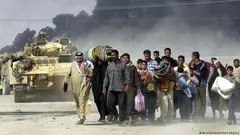 20 years Iraq War
20 years Iraq WarFarewell to the old world order
It is 20 years since the USA began its invasion of Iraq. Alongside the countless dead Iraqis and U.S. soldiers, it was the West’s credibility in the Arab world that would fall victim to this war. As Karim El-Gawhary argues, this loss is still having consequences two decades later
-
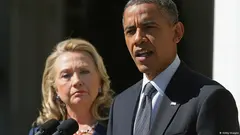 America’s partisan war
America’s partisan warBenghazi 9/11 casts a long shadow
Cries of "Benghazi!" still resonate across the USA ten years after a deadly terrorist attack in Libya killed the U.S. ambassador and three other Americans. Ethan Chorin re-tells Benghazi as a watershed moment, one that has helped create today's America: polarised, fearful and dangerously unstable. Sherif Dhaimish read the book
-
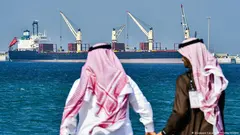 Saudi Arabia
Saudi ArabiaDo billion-dollar investments overseas hide a political agenda?
Saudi Arabia is using its oil wealth to invest huge sums in other countries, apparently to diversify its own economy. Critics are concerned that the build-up of financial muscle abroad could be used for political ends. Cathrin Schaer reports
-
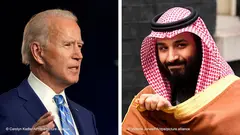 Saudia Arabia and the UAE
Saudia Arabia and the UAEGetting Washington wrong
Analyst Iyad El-Baghdadi examines the ongoing tensions between the United States and the two Gulf states – Saudi Arabia and the UAE – and their geopolitical implications in interview with Rayyan Al-Shawaf
-
 UAE's Mohammed bin Zayed al-Nahyan
UAE's Mohammed bin Zayed al-NahyanIran and Islamists a threat to Gulf safe haven
United Arab Emirates strongman Sheikh Mohammed bin Zayed al-Nahyan, who was formally elected president on 14 May, has led a realignment of the Middle East, creating a new anti-Iran axis with Israel while fighting a rising tide of political Islam in the region
-
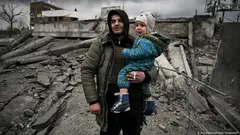 Open-source on Russia's crimes
Open-source on Russia's crimesLessons learnt in Syria help Ukraine
Researchers have spent years collecting evidence of Russian war crimes in Syria, using everything from social media to satellite images. Open-source research has evolved. Cathrin Schaer asks whether it could help bring justice to Ukraine faster
-
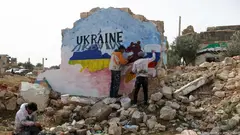 Syrians and the Ukraine war
Syrians and the Ukraine war"We share a similar suffering"
Syrian opposition activists say they know what it's like to go up against the Russian military. Some experts think things may have turned out differently in Ukraine if the West had stood up to the Kremlin over Syria. By Diana Hodali
-
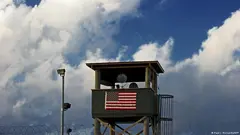 America and the War on Terror
America and the War on TerrorGuantanamo's "forever prisoners"
The notorious U.S. prison camp is 20 years old. Over the years, several plans to close it have been rejected. For the detainees, little has changed in the last two decades. Oliver Sallet reports from Guantanamo Bay
-
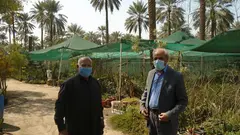 Climate heroes in Iraq
Climate heroes in IraqA life for the trees
It is getting hotter and hotter in Iraq. Fifty degrees or more is no longer a rarity. The state between the Euphrates and Tigris rivers is now one of the hottest countries on earth. Muwafaq Mubareka from Baghdad is determined to fight global warming. Birgit Svensson paid the climate hero a visit
-
 The Longest War – 20 years of the "War on Terror"
The Longest War – 20 years of the "War on Terror"Afghanistan: Emran Feroz' chronology of a disaster
The "War on Terror" has not only failed in Afghanistan, it has exacerbated insecurity and generated more terrorism. This is the main thrust of journalist Emran Feroz in his book, which was published, appropriately enough, 20 years after the attacks of 11 September 2001 and the subsequent invasion of Afghanistan by the USA and NATO. Behnam Said read the book for Qantara.de
-
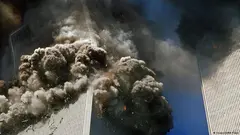 9/11 twenty years on
9/11 twenty years onHow the 'War on Terror' destabilised the Middle East
Two decades after the attacks of 11 September 2001, the West faces the shattered debris of its failure – not only in Afghanistan, but also in Iraq, Syria, Libya and Yemen. What went wrong in the war on terror? And what lessons can Europe learn from it? Essay by Kristin Helberg
-
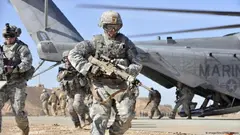 20 years after 9/11
20 years after 9/11U.S. war on terror is still omnipresent
Twenty years after 9/11, the United States is recalibrating its war policy. However, its assertions that the era of endless wars is over are a myth, writes Maha Hilal